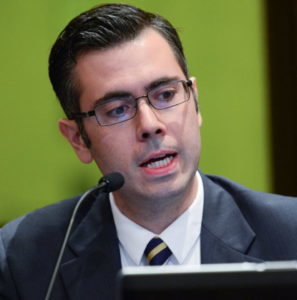By IRIC NATHANSON
 At least one Minneapolis City Council Member is sharply critical of a new proposal to tighten up management of the city’s neighborhood groups. The Twelfth Ward’s Andrew Johnson (photo right submitted) is calling the plan, known as Neighborhoods 2020, a “recipe for failure.”
At least one Minneapolis City Council Member is sharply critical of a new proposal to tighten up management of the city’s neighborhood groups. The Twelfth Ward’s Andrew Johnson (photo right submitted) is calling the plan, known as Neighborhoods 2020, a “recipe for failure.”
The proposal was drafted by the Minneapolis Neighborhoods and Community Relations Department. If approved by the City Council, Neighborhoods 2020 could require groups like the Longfellow Community Council and the Nokomis East Neighborhood Association to comply with new city standards or risk losing city funding.
Johnson is particularly concerned about Neighborhoods 2020’s diversity provisions that would apply to the composition of each organization’s board of directors. The plan would require the city’s funded neighborhood groups to submit annual reports describing the make-up of their boards. If a board’s diversity differed significantly from the neighborhood’s demographics, the organization would be required to file a “Diversity Action Plan” aimed at encouraging new board members that “reflects the diversity within the neighborhood including race, gender, age, income and homeowners and renter status.” According to Neighborhoods 2020, “organizations that do not complete a plan and meet board diversity standards within 18 months may have their funding reduced or terminated.”
Johnson, a former chair of the Longfellow Community Council (LCC), maintains that the draft plan will require neighborhood groups to meet standards that the city, itself, has been unable to meet. “Despite all our efforts and all our action plans, the City has seen at firsthand how difficult a challenge it has been to diversify our workforce and move the needle on this important issue. So when I see the punitive provisions in Neighborhoods 2020, I think about what would happen if those provisions were imposed on the City of Minneapolis by the State of Minnesota. If the State gave the City just 18 months to meet similar diversity standards, we’d lose our state funding and go bankrupt!”
“This punitive approach is clearly a recipe for failure,” Johnson added. “It will only succeed in damaging the very organizations it is intended to help. I would much prefer to see us use a carrot rather than a stick when it comes to neighborhood development.”
 LCC’s Executive Director, Melanie Majors (photo left submitted), shares Johnson’s concerns. “This new proposal, coming on the heels of the 2040 plan, is overburdening neighborhoods groups, particularly those small organizations with more limited capacity,” she notes. “The plan is setting out more directives for groups like ours without providing us with a clear path on how to comply. Neighborhoods 2020 is clearly overreach on the part of City Hall. City Hall hasn’t figured out a way of dealing with its own diversity problems so now it is putting the burden on us.”
LCC’s Executive Director, Melanie Majors (photo left submitted), shares Johnson’s concerns. “This new proposal, coming on the heels of the 2040 plan, is overburdening neighborhoods groups, particularly those small organizations with more limited capacity,” she notes. “The plan is setting out more directives for groups like ours without providing us with a clear path on how to comply. Neighborhoods 2020 is clearly overreach on the part of City Hall. City Hall hasn’t figured out a way of dealing with its own diversity problems so now it is putting the burden on us.”
“The approach we are being asked to take is almost like tokenism when it comes to renters and people of color,” Major maintains. “It says that because you are a renter or a person of color, you are not able to determine for yourself what is happening in your neighborhood that might affect you. I think that is quite demeaning. That is not the approach we take in Longfellow. We start with the premise that everyone has a stake in the neighborhood. Neighborhoods 2020 presupposes that we don’t reach out to renters and people of color. That’s not right. We do reach out.”
Becky Timm, Nokomis East Neighborhood Association’s Executive Director, notes that diversity and inclusion are important goals for her organization. “NENA’s board understands that we need to reflect the people who live in our neighborhood. We have done a lot of work—a lot of outreach—to make sure that we truly represent the neighborhood. We have spent the last year recruiting renters and people of low wealth to become part of our association and part of our board. We are working on a leadership development pipeline. We are hiring a second community organizer. Our current organizer speaks Spanish, and our new staff person will speak Somali. All of this is hard work. But we know it is something we need to do.”
Steve Gallagher, the policy specialist for the city’s Neighborhoods and Community Relations Department, acknowledges the concerns about the impact of his department’s plan, but he notes that the plan is merely a framework, not the “final package.” If the framework is adopted by the Council, Gallagher says that NCR will prepare follow-up guidelines and go out to the neighborhoods for further review. “Our overall aim is to help all neighborhoods become stronger. We know that one-third of our groups are making great progress in achieving their diversity and inclusion goals. Another third are doing an adequate job, but the final third needs help in getting the job done.”
Gallagher says he expects the Council to act on the framework in mid-April. NCR would then work on guidelines with an additional comment period before the guidelines are finalized. After that happens, the guidelines would be sent to the Council for final action. “We want to make sure that organizations and individuals have full opportunities to provide their input as this process moves forward.”
Editor's Note: There will be a Neighborhoods 2020 Community Meeting on Tues., Mar. 19, 6:30-8:30pm at Longfellow Park, 3435 36th Ave. S.
Comments
No comments on this item Please log in to comment by clicking here